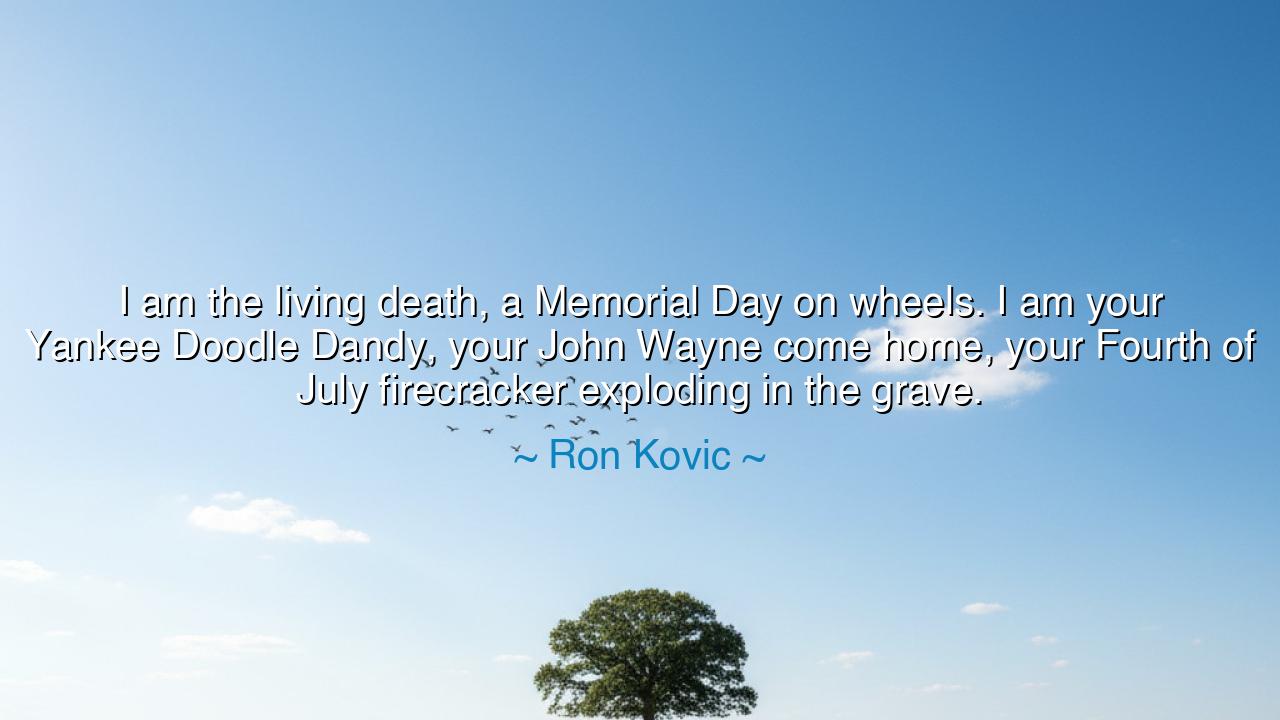
I am the living death, a Memorial Day on wheels. I am your Yankee
I am the living death, a Memorial Day on wheels. I am your Yankee Doodle Dandy, your John Wayne come home, your Fourth of July firecracker exploding in the grave.






“I am the living death, a Memorial Day on wheels. I am your Yankee Doodle Dandy, your John Wayne come home, your Fourth of July firecracker exploding in the grave.” — thus spoke Ron Kovic, the wounded soldier turned prophet of conscience, whose words cry out from the heart of war’s ruin. In this searing confession, he gives voice to the pain of a generation — the sons who went forth in glory and returned broken, their bodies shattered and their spirits haunted by the very ideals that once inspired them. His words are both lamentation and accusation, a mirror held to a nation that glorifies war yet forgets the cost paid in flesh and memory.
To understand this quote is to enter the shadowed aftermath of the Vietnam War, where triumph was replaced by trauma and patriotism by disillusionment. Kovic, once a proud Marine, was paralyzed from the chest down by a bullet in combat. In his book Born on the Fourth of July, he became the voice of the veteran who had believed in the shining dream of America — freedom, heroism, and honor — only to discover the cruel contradiction of that dream. When he calls himself “the living death,” he speaks not only of his physical paralysis but of a deeper spiritual death: the death of innocence, of faith, of the unexamined love for country that could no longer survive the truth of war.
And yet, in his suffering, Kovic becomes a living memorial, “a Memorial Day on wheels.” He embodies the cost that most would rather forget. His crippled body becomes a testament to the sacrifices made by countless soldiers — not the abstract heroes of parades and monuments, but the wounded and the lost, the men whose pain continues long after the cannons fall silent. Like the stone statues that line the cemeteries of nations, he too bears silent witness. But unlike them, he breathes, speaks, and demands that the living remember not only the glory of war, but its agony. He is, in his own words, a “memorial on wheels” — a human reminder that the true price of patriotism cannot be measured in medals or flags, but in the wounds that never heal.
When Kovic calls himself “your Yankee Doodle Dandy, your John Wayne come home,” he invokes the myths of American masculinity and heroism — the soldier, the cowboy, the fearless man who defends freedom and never doubts the righteousness of his cause. These figures were the idols of his youth, the archetypes that sent millions marching to battle in foreign lands. But now, he returns as their broken reflection, the living contradiction of their image. John Wayne rode off into the sunset; Ron Kovic came home to a wheelchair. The songs of patriotism still play, but he has seen the truth behind them — that the same hands that salute the flag may turn away from the wounded who fought beneath it. His tone is both sarcastic and sacred, mocking the false myth while revealing its tragic core.
The phrase “your Fourth of July firecracker exploding in the grave” is perhaps the most haunting of all. The Fourth of July, America’s day of freedom and pride, is transformed into an image of death and decay. The “firecracker,” symbol of joy and celebration, becomes an explosion of despair — a metaphor for the young lives consumed by war. Kovic himself was “born on the Fourth of July,” a child of America’s promise; yet he became, through war, its wounded conscience. His body, once filled with life and movement, is now the grave in which his youthful dreams lie buried. But in speaking these words, he resurrects them — not as illusions, but as warnings.
Throughout history, the ancients have honored the warrior as both hero and sacrifice. The Greeks built temples to Achilles, whose glory was eternal but whose life was brief. The Romans celebrated their generals with triumphs, yet behind every victory marched the dead. Kovic belongs to this lineage, but his voice speaks a new kind of truth — not of conquest, but of reckoning. He is not the conqueror who returns in triumph; he is the witness who returns to testify. Like the old prophets who tore their garments before corrupt kings, he forces his nation to see what it would rather forget: that freedom built on denial is no freedom at all.
So, my listener, take this teaching to heart. Remember those who return from war not as symbols, but as souls. Do not worship victory and ignore the wounded. Do not wave the flag without asking what it means. When you celebrate your freedom, let your gratitude be honest, not blind. Honor the living memorials among you — the veterans, the healers, the mourners — for they bear the truth that keeps a nation human. As Ron Kovic reminds us, patriotism without compassion is empty, and remembrance without understanding is hollow. If we are to call ourselves free, we must face both the firecracker and the grave — the light of our ideals and the shadows they cast. Only then may we build a future where the sons and daughters of any land need not return as “living deaths,” but as living testaments to peace.






AAdministratorAdministrator
Welcome, honored guests. Please leave a comment, we will respond soon